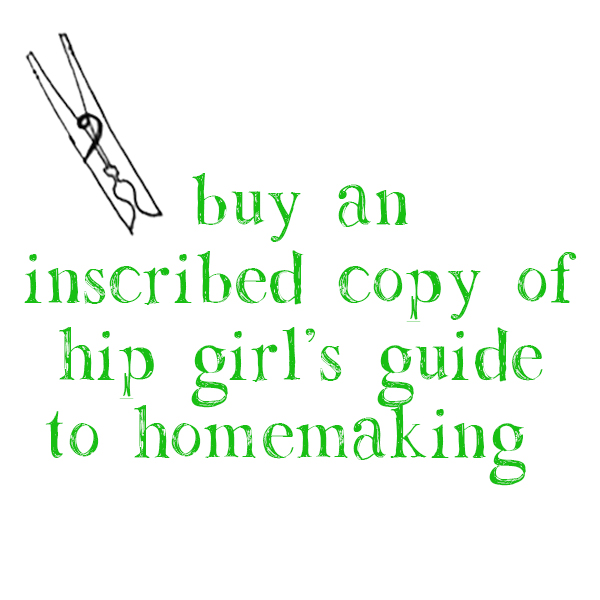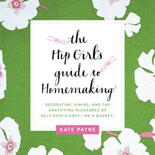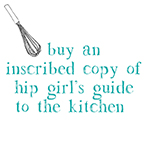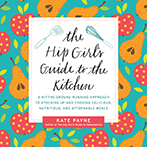Kitchen Ecosystem Book Giveaway
This book, y’all.
This is the one for all your resolutions. Resolve to kick more ass in the kitchen. Resolve to use up everything you buy, down to the bits and bobs. Resolve to cook cyclically and keep things moving through your kitchen.
I was writing my first book when this book was just a mind-blowing blog post on Eugenia’s Denver Post blog. In Hip Girl’s Guide to Homemaking, Eugenia allowed me to share with readers her concept of infusing your kitchen ecosystem with homemade staples, which in turns cuts down on waste and elevates flavor in ways that commercially made staples just cannot. The blog post is now fleshed out into a gorgeous and totally useful book.
“In the last five years or so, lots of people have gotten interested in preserving foods. I love it: It feels like a revolution. But I think the next step is to value and use the waste streams of our foods. […] We need to catch juices, render fats, reserve waters vegetables were boiled in, save herb stems and cheese rinds and citrus zests, and use them to enhance our cooking.”
Eugenia’s earlier canning resource book, Well Preserved, was the first book I purchased on canning and preserving. I bought it at Greenlight Bookstore in 2009. This particular book appealed to me at the time because it included recipes for what to do with each of the preserved items once you preserved them. (Ogling them on your pantry shelf only goes so far…) The kitchen ecosystem ideas (and Eugenia herself) have been a guiding force for me and totally reshaped my approach to the kitchen, which is, in large part, why I now have a kitchen book myself.
The Kitchen Ecosystem book is organized by ingredients that leave some sort of edible waste stream. And in that geeks-unite way, the flow charts are enchanting. They include tiers for eating some fresh, preserving some, using the preserves, and using the scraps. They are intended for you to riff from and create your own flow charts every time you bring in small quantities of locally-grown, in-season foods.
I can’t wait to share this book with one lucky reader. Clarkson Potter is offering up this giveaway and they’ve requested that I keep it within US and Canada only. Please enter via the widget below.
Disclosures: I purchased a copy of The Kitchen Ecosystem with my own money, but the giveaway recipient’s copy is complementary from Clarkson Potter. The book links in the above post magically deposit a tiny pittance in my savings account each month if you buy the books using those links.





 Monday, January 19, 2015 at 7:30AM
Monday, January 19, 2015 at 7:30AM


Reader Comments (27)
My kitchen ecosystem that I enjoy developing is preserving the harvests from kitchen garden that produces food year round and my fruit trees.
We don't keep a garden (not enough sun for it sadly enough) so I have never been one to compost. Want to get better about our scraps so less of it goes to waste.
I just found your books and site a few days ago. I love this already. I can't wait to read this book! Thank you for the giveaway.
Preserving fats has always seemed daunting to me, would be a super handy thing to learn.
When I'm prepping food, I toss all the trimmings into a freezer bag for a veggie broth. And if we ever have leftovers just too small to do anything else with, I add those, too. My problem area is bananas. With just two of us, it's awfully easy for those things to get too ripe too fast for us. And there's only so much banana bread we can manage.
Pick me! Pick me!
This past year I've started fermenting, canning, dehydrating, and freezing. I need all the additions to my Old Timey Living kitchen library that I can get!!
I'm looking to use more scraps from my kitchen into broths, compost, or other ways to prevent them from being trashed!
I would love to have this book. This is what I have been trying,but I could use the help.
I really haven't thought about it in terms of ecosystems, so I'm not sure what system I'm looking to improve. I suspect it will be something we tend to avoid buying because we don't go through it quickly enough to keep from wasting some significant portion of the item or container of the item.
I am trying really hard to waste less food.
Gorgeous book! Looks like a staple for the kitchen and a great gift for a new cook.
We're pretty good about making use of everything in our kitchen. We save scraps for stock, can, ferment, infuse...really, what we need to get better at is using all the things we make! My canned good pantry is almost full, and it'll be spring before you know it! We need to make a dent in what we already have.
I really want to learn more about canning so I'm ready for summer!
I use all my bones for bone broth and always zest my citrus no matter if the recipe calls for it or not, but I'm always looking of more thrifty tricks and ideas!
I love learning about recycling and preserving ingredients in different ways! I've learned canning, freezing, pickling, fermenting, and can't wait to learn more :)
I want to gather my scraps for composting more this year.
We are very good at composting the kitchen scraps. I want to make more broth after roasting whole chickens. Love the idea of getting the most out of everything.
We garden. We compost. We preserve. We <3 local.
So far I've only made Jams and Jellies for use on the lunch PB&J's. I'd like to get into pickling, since they are very popular at my table.
I want to work on preservatives and composts :)
I'm looking for even more ideas to decrease my kitchen waste.
I'm always looking for ways to reduce food waste. Can't wait to check this book out at the library.
I'd like to develop my own veggie soup stock. I've read that it's an easy and tasty thing to do, but I just haven't done it yet. I love making soup, so this would be a great way to motivate me.
Reducing food waste, for sure, but learning about what else I can make from things I now throw away is my main goal. What other yummy or useful thing can I make out of "trash".
I love the idea of thinking of the kitchen as an ecosystem.